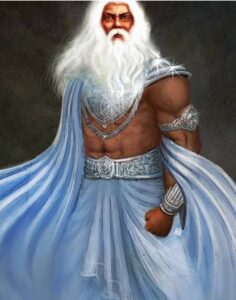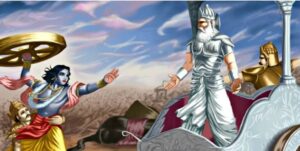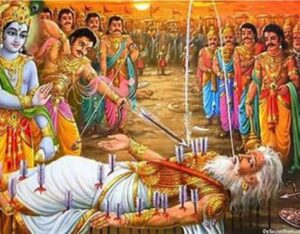MAHABHARAT ICONIC WARRIOR BHISHMA PITAMAH
In the Mahabharat, Bhishma Pitamah, also known as Bhishma, was a formidable warrior with extraordinary abilities and powers. Bhishma’s powers and virtues made him a central and respected figure in the Mahabharat, symbolizing loyalty, sacrifice, and adherence to dharma. Some of his notable powers and attributes include:
Immortality until he choose to die:
Due to a boon granted by his father Shantanu, Bhishma had the power to choose the time of his death. He could not be killed unless he willingly gave up his life.
Unmatched Martial Skills:
Bhishma was a master of all forms of warfare, including archery, sword fighting, and hand-to-hand combat. His combat skills were unparalleled, and he was considered one of the greatest warriors of his time.
Boons from Devas:
Bhishma had received various boons from celestial beings, enhancing his strength and invincibility in battle. These boons made him almost invulnerable to ordinary weapons.
Infinite Arrows:
Bhishma had the ability to shoot arrows continuously without ever depleting his quiver. This made him a formidable archer on the battlefield. Bhishma had knowledge of astral warfare, allowing him to fight in the astral plane, making him a challenging opponent even for powerful celestial beings.
Expert in Scriptures:
Apart from his martial skills, Bhishma was well-versed in scriptures, philosophy, and dharma. He was a wise and knowledgeable advisor, respected for his intellect and understanding of ethical principles. Bhishma was proficient in using various divine weapons and astras (celestial weapons). He could invoke and use these weapons effectively in battle.
Unbreakable Oath:
Bhishma took a vow of lifelong celibacy and loyalty to the throne of Hastinapura. This unbreakable oath, known as the Bhishma Pratigya, granted him immense spiritual strength.
Self-Control:
Bhishma possessed exceptional self-control and had conquered his desires. His ability to control his emotions and desires contributed to his reputation as a virtuous and disciplined warrior.
Loyalty To Hastinapura:
In the Mahabharat , Bhishma Pitamah, despite being on the side of the Kauravas due to his vow of loyalty to Hastinapura, was caught in a moral dilemma. He had deep affection for both the Pandavas and the Kauravas, which put him in a difficult position.
Bhishma’s prowess in battle was unmatched. He fought valiantly, displaying extraordinary skills and bravery on the battlefield. However, his dilemma about fighting against the Pandavas, whom he loved and respected, affected his effectiveness during the initial days of the war.
Bed of Arrows:
To resolve this moral conflict, Bhishma decided to use his powers to control the duration of his life. He chose to remain on a bed of arrows (Shara Shayya) and not to fight actively until he felt the time was right. He did this so that he could choose the moment of his death according to his own will.
Bhishma’s bed of arrows was provided by Lord Krishna, who acted as a charioteer for Arjuna. Bhishma laid on this bed, pierced by numerous arrows, for a total of 58 nights during the course of the war. Throughout this time, he continued to provide valuable guidance and teachings to the Kaurava army and those who visited him, imparting his wisdom until the end.
Moment Of Death:
Finally, on the tenth day of the war, realizing that the Kauravas were unable to defeat the Pandavas due to their adherence to dharma and righteousness, Bhishma decided to unleash his full power. He fought fiercely, causing great devastation on the battlefield. However, Arjuna, guided by Lord Krishna, found a way to counter Bhishma’s attack.
Arjuna shot a powerful arrow that pierced Bhishma’s armor and mortally wounded him. As Bhishma fell, he continued to impart his wisdom and blessings to those around him. He then chose the moment of his death, leaving his mortal coil and merging with the divine.
Bhishma’s death marked a turning point in the Kurukshetra War and had a profound impact on the events that followed. His sacrifice and adherence to dharma in the face of moral dilemmas continue to be remembered and revered in Hindu tradition.




